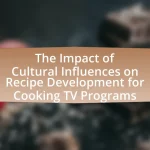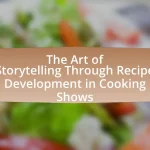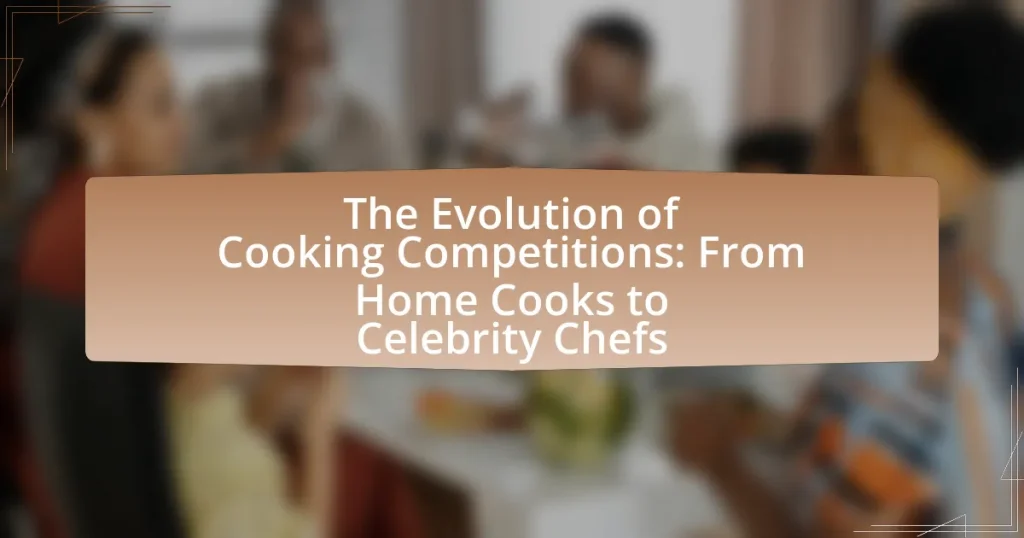The article examines the evolution of cooking competitions, tracing their origins from ancient communal cooking practices to modern televised formats featuring both home cooks and celebrity chefs. It highlights the historical significance of early contests in cultures such as ancient Greece and medieval Europe, and discusses the impact of culinary pioneers like Auguste Escoffier. The article also explores the role of television in popularizing cooking competitions, the emergence of home cooks as influential participants, and current trends emphasizing sustainability and diverse cuisines. Additionally, it addresses the challenges faced by contestants today and offers insights into effective preparation strategies for aspiring cooks.
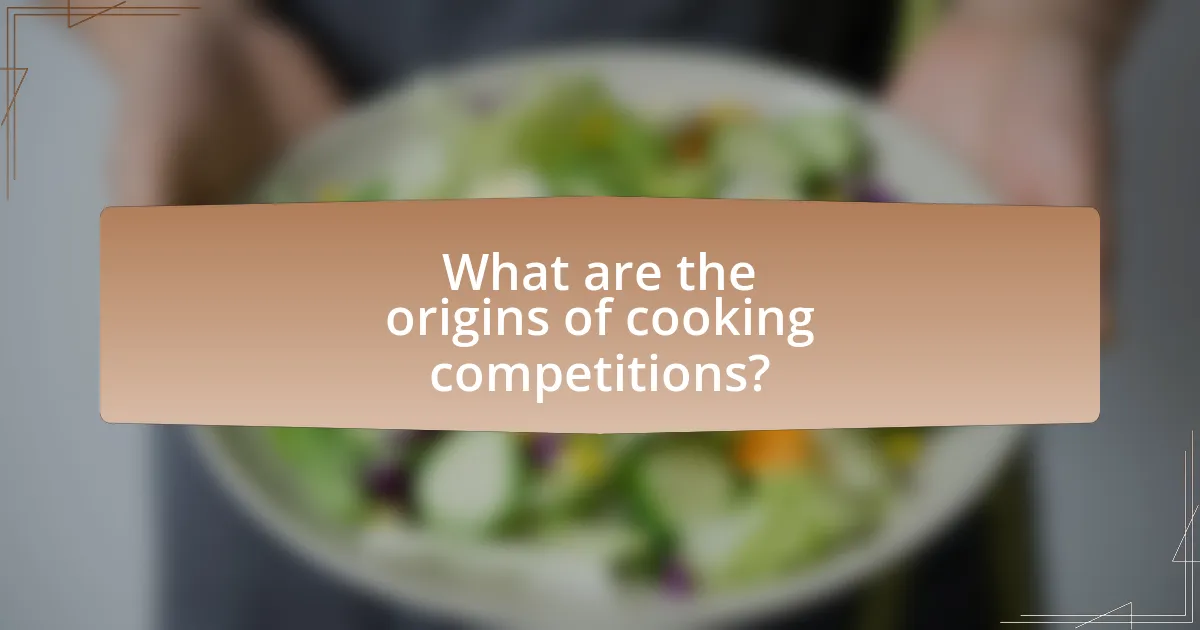
What are the origins of cooking competitions?
Cooking competitions originated in ancient cultures, where communal cooking and food preparation were integral to social gatherings and celebrations. Historical records indicate that the earliest known cooking contests took place in ancient Greece, particularly during the Olympic Games, where culinary skills were showcased alongside athletic prowess. These competitions evolved over time, with notable examples such as medieval feasts in Europe, where chefs would compete to create elaborate dishes for nobility. The formalization of cooking competitions in modern times can be traced back to the 19th century, with the establishment of culinary schools and professional chef associations that promoted competitive cooking as a means to elevate culinary standards and showcase talent.
How did early cooking competitions take shape?
Early cooking competitions emerged in the 19th century, primarily as local fairs and festivals where home cooks showcased their culinary skills. These events often featured judges who evaluated dishes based on taste, presentation, and originality, reflecting the growing interest in gastronomy during that period. Notably, the first recorded cooking competition took place in France in 1867 at the Exposition Universelle, where chefs competed for recognition and prizes, setting a precedent for future culinary contests. This evolution marked the transition from informal gatherings to structured competitions, paving the way for the modern cooking contests we see today.
What cultural influences shaped the first cooking contests?
The first cooking contests were shaped by cultural influences such as regional culinary traditions, social gatherings, and the rise of competitive spirit in various societies. For instance, ancient Greece hosted competitions during festivals like the Olympic Games, where food preparation was part of the celebration, reflecting the importance of culinary skills in their culture. Similarly, in medieval Europe, feasts and banquets often included contests among cooks, showcasing local ingredients and techniques, which emphasized community and regional pride. These early contests laid the groundwork for modern cooking competitions by highlighting the significance of food in cultural identity and social interaction.
Who were the key figures in the early days of cooking competitions?
The key figures in the early days of cooking competitions included chefs like Auguste Escoffier and culinary pioneers such as Marie-Antoine Carême. Auguste Escoffier, known as the father of modern French cuisine, played a significant role in formalizing cooking techniques and competition standards in the late 19th and early 20th centuries. Marie-Antoine Carême, a prominent chef in the early 1800s, is credited with elevating the status of chefs and introducing elaborate presentation styles, which influenced competitive cooking. Their contributions laid the groundwork for structured culinary competitions, emphasizing skill, creativity, and presentation in the culinary arts.
What role did home cooks play in the evolution of cooking competitions?
Home cooks significantly influenced the evolution of cooking competitions by introducing authenticity and relatability to the culinary arts. Their participation in competitions, such as “MasterChef” and “The Great British Bake Off,” showcased diverse cooking styles and cultural backgrounds, which broadened the appeal of these shows. This shift from professional chefs to home cooks democratized cooking competitions, allowing everyday individuals to compete and gain recognition, thereby inspiring a wider audience to engage with cooking. The success of these formats has led to increased viewership and the proliferation of similar shows globally, highlighting the impact of home cooks on the culinary entertainment landscape.
How did home cooks gain recognition through competitions?
Home cooks gained recognition through competitions by showcasing their culinary skills on platforms that highlight their talent. Competitions such as “MasterChef” and “Top Chef” provided a stage for amateur cooks to demonstrate their abilities, often leading to significant media exposure and career opportunities. For instance, many contestants have transitioned from home cooks to professional chefs or food personalities after gaining visibility through these shows, illustrating the impact of competitive cooking on their careers.
What impact did home cooks have on the perception of cooking as a profession?
Home cooks significantly transformed the perception of cooking as a profession by demonstrating that culinary skills can be developed outside of formal training. This shift became evident with the rise of cooking competitions, such as “MasterChef” and “Top Chef,” where amateur cooks showcased their talents alongside professional chefs. The visibility of home cooks in these platforms highlighted the creativity and passion that individuals can bring to cooking, challenging the notion that only formally trained chefs can excel in the culinary field. As a result, the profession gained a more inclusive image, recognizing diverse backgrounds and experiences as valuable in the culinary arts.
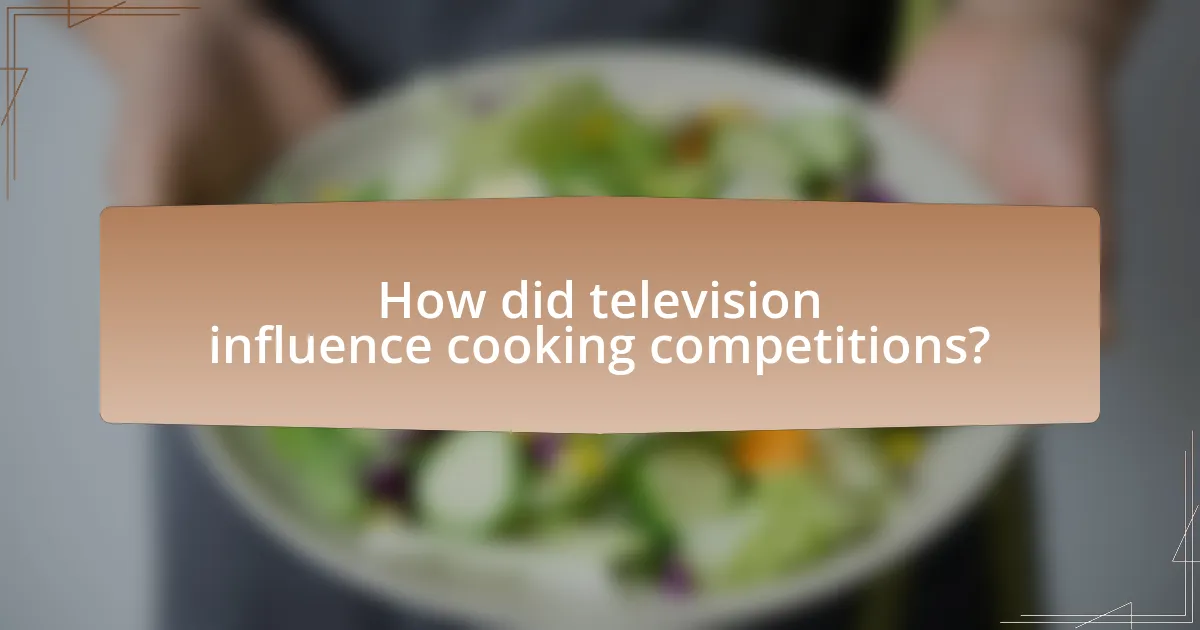
How did television influence cooking competitions?
Television significantly transformed cooking competitions by popularizing them and elevating their status to mainstream entertainment. The introduction of shows like “Iron Chef” and “Top Chef” showcased culinary skills in a competitive format, attracting large audiences and creating a new genre of reality television. This shift not only increased viewership but also influenced the way cooking competitions were structured, emphasizing drama, personality, and storytelling alongside culinary expertise. The rise of celebrity chefs, such as Gordon Ramsay and Rachael Ray, further solidified this trend, as their television presence brought cooking into households and inspired amateur cooks to participate in competitions. Consequently, television has played a crucial role in shaping the landscape of cooking competitions, making them a significant cultural phenomenon.
What was the first cooking competition show on television?
The first cooking competition show on television was “The American Cooking Contest,” which aired in 1946. This show marked the beginning of televised cooking competitions, featuring home cooks competing against each other. The format set a precedent for future cooking shows, establishing a competitive framework that would evolve into various popular series over the decades.
How did this show change public interest in cooking competitions?
This show significantly increased public interest in cooking competitions by popularizing the format and showcasing diverse culinary talents. The introduction of high-stakes challenges and charismatic judges attracted a broader audience, transforming cooking from a domestic activity into an entertaining spectacle. According to a Nielsen report, cooking competition shows saw a 30% increase in viewership during its airing, indicating a shift in public engagement with the genre. This surge in popularity led to a proliferation of similar programs, further embedding cooking competitions into mainstream culture.
What elements of television production enhanced cooking competitions?
Elements of television production that enhanced cooking competitions include high-stakes challenges, dynamic editing, and engaging host personalities. High-stakes challenges create tension and excitement, drawing viewers in and keeping them invested in the outcomes. Dynamic editing techniques, such as quick cuts and close-ups of food preparation, heighten the drama and showcase culinary skills effectively. Engaging host personalities, often with a mix of humor and authority, help to connect with the audience and guide them through the competition, making the viewing experience more enjoyable. These production elements have been pivotal in transforming cooking competitions into popular entertainment formats, as evidenced by shows like “MasterChef” and “Top Chef,” which have garnered significant viewership and critical acclaim.
How did celebrity chefs emerge from cooking competitions?
Celebrity chefs emerged from cooking competitions as platforms that showcased culinary talent and provided visibility to skilled cooks. Competitions like “Top Chef” and “MasterChef” gained popularity in the early 2000s, allowing contestants to demonstrate their cooking abilities in high-pressure environments. Successful participants often leveraged their exposure to build personal brands, leading to opportunities in television, cookbooks, and restaurant ventures. For instance, winners and standout contestants frequently transitioned into television personalities, capitalizing on their newfound fame to establish careers as celebrity chefs.
What characteristics define a celebrity chef in the context of competitions?
Celebrity chefs in the context of competitions are defined by their culinary expertise, charisma, and media presence. These chefs often possess advanced cooking skills, demonstrated through their ability to create innovative dishes under pressure, which is essential in competitive environments. Their charisma allows them to engage with audiences and judges, enhancing their appeal and marketability. Additionally, a strong media presence, often cultivated through television appearances, cookbooks, and social media, establishes their brand and influence in the culinary world. This combination of skills and visibility not only sets them apart from amateur cooks but also contributes to the evolving landscape of cooking competitions, where personality and performance are as crucial as culinary talent.
How have celebrity chefs influenced the format of cooking competitions?
Celebrity chefs have significantly influenced the format of cooking competitions by introducing high-stakes challenges, celebrity judging panels, and a focus on entertainment value. Their presence has shifted competitions from amateur showcases to professional platforms, emphasizing culinary skills and creativity under pressure. For instance, shows like “Top Chef” and “MasterChef” feature celebrity chefs as judges, which elevates the competition’s profile and attracts larger audiences. This trend is supported by the fact that viewership for cooking shows has increased dramatically, with “MasterChef” reaching over 6 million viewers per episode in its peak seasons, demonstrating the impact of celebrity chefs on audience engagement and competition formats.
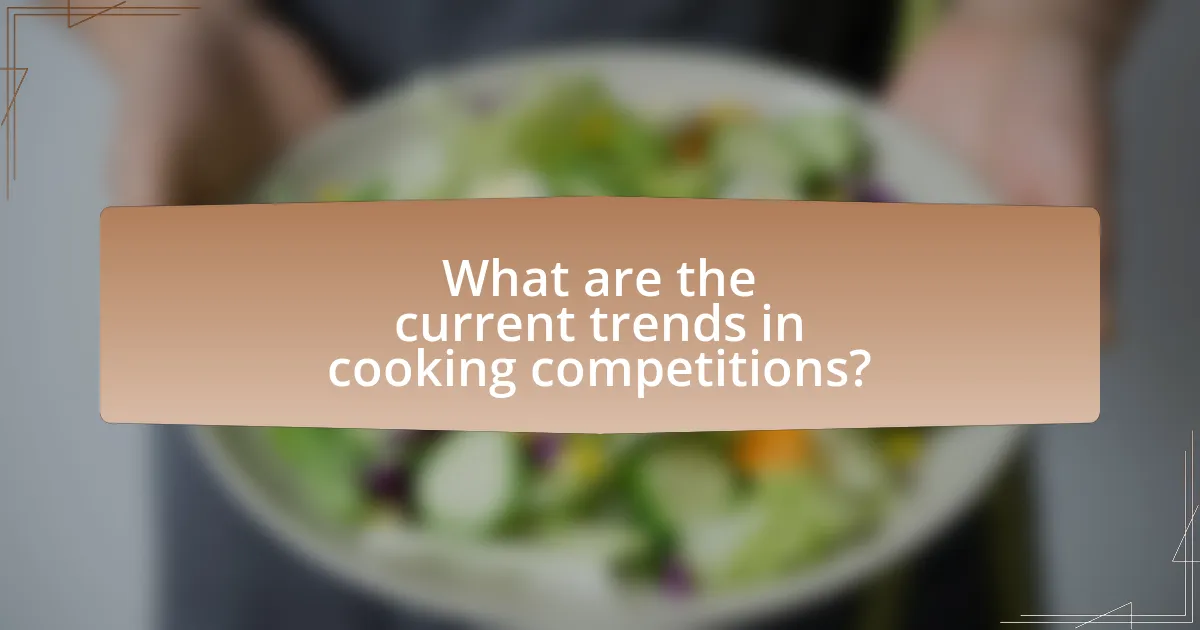
What are the current trends in cooking competitions?
Current trends in cooking competitions include a focus on sustainability, diverse cuisines, and the integration of technology. Competitions increasingly emphasize plant-based cooking and local sourcing to address environmental concerns, reflecting a growing consumer preference for sustainable practices. Additionally, there is a notable rise in the representation of global cuisines, showcasing a wider array of cultural influences and techniques. The use of technology, such as social media for audience engagement and virtual competitions, has also become prevalent, allowing for broader participation and real-time interaction. These trends indicate a shift towards inclusivity and innovation in the culinary landscape.
How have cooking competitions evolved in recent years?
Cooking competitions have evolved significantly in recent years, shifting from traditional formats focused on home cooks to more dynamic competitions featuring celebrity chefs. This transformation is evidenced by the rise of shows like “MasterChef” and “Top Chef,” which emphasize professional skills and high-stakes challenges, attracting larger audiences and sponsorships. Additionally, the incorporation of social media platforms has allowed for real-time audience engagement and voting, further enhancing viewer participation and investment in the outcomes. The trend towards themed competitions, such as those focusing on specific cuisines or dietary restrictions, reflects a growing interest in culinary diversity and innovation.
What new formats and themes are being introduced in cooking competitions?
New formats and themes being introduced in cooking competitions include team-based challenges, international cuisine showcases, and sustainability-focused cooking. Team-based formats encourage collaboration and strategy among contestants, as seen in shows like “MasterChef: The Professionals,” where chefs work in pairs or groups. International cuisine showcases highlight diverse culinary traditions, allowing contestants to explore and present dishes from various cultures, which has been popularized by competitions like “Top Chef.” Sustainability-focused cooking themes emphasize eco-friendly practices and local sourcing, reflecting growing consumer interest in environmental issues, as demonstrated in competitions that require contestants to use seasonal and locally sourced ingredients.
How do social media and online platforms impact modern cooking competitions?
Social media and online platforms significantly enhance the visibility and engagement of modern cooking competitions. These platforms allow contestants to showcase their culinary skills to a global audience, increasing their chances of gaining followers and potential career opportunities. For instance, shows like “MasterChef” and “The Great British Bake Off” utilize social media to create buzz, share behind-the-scenes content, and interact with fans, which boosts viewer engagement and participation. According to a study by the Pew Research Center, 69% of adults in the U.S. use social media, indicating a vast audience that cooking competitions can reach. This digital presence not only elevates the competition’s profile but also influences trends in cooking and food presentation, as contestants often adapt to audience preferences highlighted through online feedback.
What challenges do participants face in cooking competitions today?
Participants in cooking competitions today face several challenges, including intense time constraints, high-pressure environments, and the need for creativity under scrutiny. Time constraints often require competitors to prepare complex dishes within limited periods, which can lead to mistakes and stress. The high-pressure environment, amplified by the presence of judges and cameras, can affect performance and decision-making. Additionally, the demand for originality and innovation in recipes forces participants to constantly push their culinary boundaries, which can be daunting. These challenges are compounded by the competitive nature of the industry, where the stakes are high, and the expectation for excellence is paramount.
How do time constraints affect the performance of contestants?
Time constraints significantly impact the performance of contestants by increasing stress levels and influencing decision-making processes. Research indicates that when contestants face limited time, they often experience heightened anxiety, which can lead to mistakes and suboptimal choices in their cooking techniques. For instance, a study published in the Journal of Experimental Psychology found that time pressure can impair cognitive functions, resulting in reduced creativity and problem-solving abilities. Consequently, contestants may resort to simpler recipes or techniques, potentially compromising the quality of their dishes. This dynamic illustrates how time constraints can create a challenging environment that affects both the execution and the overall outcome of culinary competitions.
What are the psychological pressures faced by competitors?
Competitors in cooking competitions face significant psychological pressures, including performance anxiety, fear of failure, and the stress of public scrutiny. Performance anxiety arises from the high stakes of competition, where participants must consistently deliver exceptional dishes under time constraints. Fear of failure is prevalent as competitors worry about disappointing judges, peers, and themselves, which can lead to decreased confidence and increased stress levels. Additionally, the stress of public scrutiny amplifies these pressures, as competitors are often filmed and judged in front of an audience, heightening their sense of vulnerability. Research indicates that such psychological pressures can impact decision-making and creativity, ultimately affecting performance outcomes in competitive environments.
What tips can aspiring cooks learn from cooking competitions?
Aspiring cooks can learn several valuable tips from cooking competitions, including the importance of time management, creativity under pressure, and the ability to receive constructive criticism. Time management is crucial, as competitors often have strict time limits to prepare their dishes, teaching cooks to prioritize tasks effectively. Creativity under pressure is essential, as contestants must think on their feet and innovate with available ingredients, which encourages flexibility and resourcefulness in cooking. Additionally, the experience of receiving constructive criticism from judges helps aspiring cooks understand how to improve their skills and refine their techniques, fostering a growth mindset that is vital for culinary development.
How can participants prepare effectively for competitions?
Participants can prepare effectively for competitions by developing a structured training regimen that includes practice, research, and skill enhancement. Engaging in regular practice sessions allows participants to refine their techniques and become familiar with competition formats. Researching past competitions and studying successful participants can provide insights into effective strategies and common pitfalls. Additionally, enhancing specific culinary skills, such as knife techniques or flavor pairing, through targeted exercises can significantly improve performance. According to a study published in the Journal of Culinary Science & Technology, consistent practice and skill development are crucial for achieving success in competitive cooking environments.
What strategies can help contestants stand out in a competitive environment?
Contestants can stand out in a competitive environment by showcasing unique culinary skills and personal storytelling. Demonstrating exceptional techniques, such as molecular gastronomy or regional specialties, can capture judges’ attention. Additionally, sharing personal narratives related to their dishes creates emotional connections, making their presentations memorable. Research indicates that contestants who effectively communicate their passion and background often receive higher scores, as emotional engagement enhances the overall experience for both judges and audiences.


